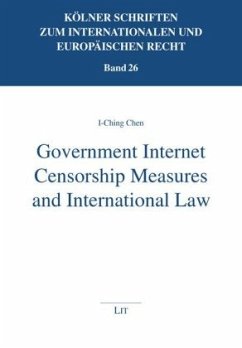Internet governance is a simple term without a simple definition. In the name of Internet sovereignty, nations have begun to implement various regulations to control the flow of information within or across their virtual territorial boundaries. The unique interconnected and multilateral characteristics of the Internet renders it impossible for one nation alone to provide adequate solutions to managing the Internet. The author argues that many of the issues related to Internet governance should be allocated to international institutions and a nation's sovereign power over the Internet should be bounded by its commitments and responsibilities under international law. In the absence of a coherent regulatory framework, this book examines whether the existing international legal systems are sufficiently generic to accommodate the challenges brought about by technological developments.
Bitte wählen Sie Ihr Anliegen aus.
Rechnungen
Retourenschein anfordern
Bestellstatus
Storno








